Guillaume Faye
La ragnatela mondiale del sistema
Il conflitto dei tempi a venire — Verso un unico modello umano — Un pianeta senza poesia — L'infezione del sistema — Spoliticizzazione della società — La tecnica e l'autoaffermazione dei popoli — Il falso mito dell'occidente.
Ex: http://www.uomolibero.com/
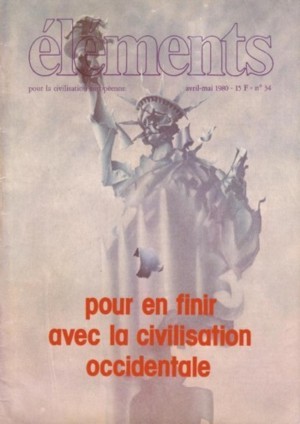 Un avvenimento considerevole si produce nel mondo contemporaneo, un avvenimento lento, silenzioso, invisibile: le culture, le civiltà, le nazioni, i paesi vengono fusi progressivamente in una struttura tiepida che trascende le divisioni destra/sinistra, est/ovest, nord/sud, che assorbe le distinzioni politiche e ideologiche, che pialla le geografie, che pietrifica la storia.
Un avvenimento considerevole si produce nel mondo contemporaneo, un avvenimento lento, silenzioso, invisibile: le culture, le civiltà, le nazioni, i paesi vengono fusi progressivamente in una struttura tiepida che trascende le divisioni destra/sinistra, est/ovest, nord/sud, che assorbe le distinzioni politiche e ideologiche, che pialla le geografie, che pietrifica la storia.
Questa struttura è il Sistema planetario. « Sistema », e non « civilizzazione ». Non esiste una civilizzazione mondiale, a dispetto delle fantasticherie di Léopold Senghor, giacché una civilizzazione rimane pur sempre culturale, organica, umana. Ora, il Sistema appare come la metamorfosi mostruosa della civilizzazione occidentale in un gigantesco meccanismo tecnoeconomico.
Il grande conflitto dei tempi a venire non opporrà più il capitalismo al socialismo, ma l'insieme delle forze nazionali, culturali, etniche, alla macchina cosmopolita del sistema occidentale, che sostituisce ai territori le sue « zone », alle sovranità le sue regioni economiche, alle culture il suo discorso massificante. La Terra diventa così un grande circo in cui il Sistema è il domatore.
Esso non ha niente di un impero mondiale, poiché non emerge da una potenza politica, ma dalla cancerizzazione della società dei consumi che si spande su tutta la planisfera. Non ha altro sovrano che un individuo astratto — l'homo universalis nato dall'incontro dell'ideologia del diritto naturale e dell'Illuminismo — dai bisogni omogenei e universali. Non ha altro governo che una convergenza di reti economiche e burocratiche transnazionali, che relegano le sovranità politiche e le volontà dei popoli al magazzino degli accessori. Gli è riuscita una rivoluzione: quella di aver smagliato il tessuto delle società, un tempo formate da insiemi organici, istituzioni, tradizioni, mestieri, gruppi e ritmi diversificati, per rifonderne la trama secondo la logica omogenea dei settori di attività tecniche ed economiche, frammentate le une in rapporto alle altre, organizzate in aggregati, come gli ingranaggi di un motore senza nessuno che lo diriga.
La crescita del Sistema è tanto più temibile in quanto i suoi funzionari si pretendono investiti di una missione, quella dell'umanismo mondiale, del pacifismo mercantilista o del socialismo riparatore delle ingiustizie. Per la loro amenità caramellosa, questi ideali appaiono più pericolosi e alienanti di tutti gli imperialismi tradizionali. Il Sistema forma una totalità sprovvista di centro, ma il cui punto focale è la società americana, i suoi trust, il suo mercato ed i suoi costumi. Si espande, dopo l'Europa occidentale e l'estremo oriente, nei paesi socialisti e nelle parti industrializzate del terzo mondo. Questa espansione, che non è più capitalista di quanto non sia socialista, utilizza le società commerciali, le istituzioni internazionali, le burocrazie nazionali come agenti economici intercambiabili, incaricati di diffondere ovunque le stesse mercanzie e le stesse strutture mentali. L'incubo che il gelido ottimismo dei tecnocrati liberali e il mondialismo ingenuo della vecchia sinistra tentano di dissipare, prende forma poco a poco: è il « migliore dei mondi ». L'alchimia della sua crescita tentacolare si compone sempre degli stessi ingredienti: le strutture tecnoeconomiche multinazionali, l'ideologia universalista ed egualitaria, la sottocultura mondiale di massa.
* * *
L'unificazione dei costumi e dei bisogni fonda un tipo umano egemonico: il regno della molle figura del piccolo borghese universale è cominciato. Sul mondo occidentalizzato si installa una borghesia mondiale, in cui prendono il loro posto anche le classi agiate dei paesi poveri e la « nomenklatura » dei paesi socialisti. Allineare i modi di vivere sul presunto modello della classe media americana, è l'aspirazione implicita di tutti i partiti, degli ambienti d'affari e di quel sottoprodotto dei mass-media che si è soliti chiamare « opinione pubblica ». Questa invoca, con buona coscienza, l'argomento dell'innalzamento del tenore di vita; impostura manifesta, che passa sotto silenzio la distruzione delle economie tradizionali e la pauperizzazione di miliardi di uomini. Questo « razzismo » incosciente, che afferma il modello economico mondiale di « sviluppo » come preferibile e superiore alle culture tradizionali dei popoli, rischia di produrre uno psichismo umano unico. La nostra specie, in questo caso, privata della diversificazione delle sue strutture mentali, non sarebbe più in grado di dare, alle sfide globali del mondo a venire, che un solo tipo di risposta, e probabilmente non certo la migliore, né la vincente.
* * *
In questo universo mentale unico, l'uomo occidentale non si definisce più per la sua origine, ma solo per il suo modo tecnoeconomico di esistenza. Un impiegato di banca di Singapore è in questo senso più occidentale di un tirolese o di un bretone radicati nella propria identità.
La Terra si trasforma in un insieme settorializzato di reti e di circuiti che lasciano spalancati degli spazi morti. Spoetizzato (1), il nostro pianeta è oggetto di « messa a frutto » non è più oggetto di conquista. Senza la padronanza del proprio spazio, i popoli non controllano più la propria geopolitica; la loro geografia, quella dell'habitat poetico e del territorio politico, resta cancellata di fronte alla divisione in zone commerciali e amministrative del Sistema. Non siamo più abitanti dei nostri luoghi, ma semplici residenti. Il Sistema non ha distrutto le patrie; le ha fossilizzate sovrapponendovisi. L'idea nazionale non è più condannata; essa è stata neutralizzata, non malgrado, ma a causa delle reverenze accademiche che le fanno con cinismo i discorsi dei politicanti. Ogni nozione di provenienza territoriale langue in questo universo di turismo di massa, d'uniformità alimentare e vestimentale, di diplomi americani, di films internazionali. Pare che Ford intenda realizzare un'automobile « globale », fabbricata in dieci paesi differenti e destinata a tutti gli automobilisti del mondo.
Come gli uomini, così anche gli oggetti non vengono più da nessuna parte. « Penso », dichiarava Gilbert Trigano, del Club Mediterranée (2) « che l'avvenire del Club risieda nell'avvento di un'atmosfera veramente cosmopolita ». Ma l'avvenire del Club Méditerranée non è quello dei popoli di cultura: l'avvento del cosmopolitismo non sarebbe per essi un'apertura come immagina Guy Scarpetta, ma un soffocamento.
Il Sistema, che non « vive », ma « funziona », sottrae i popoli al tempo storico. Fondato su mode, movimenti di consumo, flussi economici, correnti d'opinione, si iscrive puramente nella cronaca. Un popolo, al contrario, va da qualche parte e viene da qualche parte. Per il Sistema la coscienza storica è sovversiva perché essa non forma buoni clienti né buoni telespettatori. Se la caratteristica propria alla Storia è quella di modificare il senso delle cose, il Sistema non è interessato che a cambiare le forme esterne: forme dei prodotti, mode. Ciò che si teme più di tutto sono le perturbazioni della storia, quelle dei Cesari e degli Imam.
Il Sistema è uno stabilizzatore. Nell'ordine mondiale stabile, le microvariazioni delle novità e delle innovazioni contrastano con la macrofissità dell'insieme. Costumi, stili artistici, etichette e ideologie politiche non si evolvono più. Il walkman (3) non è un'innovazione, ma un aggravarsi di una forma di vita già ben installata: il narcisismo tecnologico. Siamo rientrati di fatto nella storia ciclica, nel circolo vizioso dell'eterno ritorno delle « riscoperte » e dei revival. I media accentuano la fissità conservatrice del sistema trasformando le idee in mercanzie che si confrontano con mercati d'opinione stabili.
Evacuata, la storia dei popoli lascia dietro di sé un grande silenzio che il cicaleccio vuoto dei media tenta di coprire; messo da parte, il mondo dei popoli, quello delle strategie continentali, delle rivolte religiose, dei grandi disegni politici, lascia il posto ai piccoli programmi di vita individuale, alla fine dei quali non vi è altro che la pensione. In queste condizioni, il sistema occidentale non lascerà tracce di civiltà. È senza memoria e non se ne conserverà il ricordo. Nella logica dell'ideologia lockiana e del protestantesimo laicizzato, esso ritiene di aver già compiuto la sua rivoluzione. Il suo « progresso » non è che la continuazione, il perfezionamento della sua espansione.
Ciò spiega come i marxisti siano disarmati di fronte alle società contemporanee, che sono, in fondo, postrivoluzionarie; e soccombano come gli altri all'appello del Sistema, appello alla fusione, alla fetalizzazione della specie umana.
* * *
Il Sistema ha conosciuto un precedente storico con la Cristianità. Anch 'essa tentò di costruire — progetto che non è stato d'altronde abbandonato — un mondialismo al di sopra delle singolarità dei popoli.
L'omogeneizzazione delle culture in nome della « salvezza » si è trasformata in omogeneizzazione in nome del diritto alla felicità borghese. Il monoteismo cambia di forma: oggi esso prende quella di complesso economico-culturale.
Il che significa che l'installazione di strutture economiche multinazionali e la diffusione di una cultura mondiale unica, costituiscono due processi globalmente legati. L'imposizione del « sistema di oggetti » occidentale presuppone l'adozione di una cultura semplicista e pragmatica che determina un'involuzione e un impoverimento spirituale. Il Sistema deve acculturare i popoli ai costumi dell'homo consumans internazionale i cui bisogni si postulano unificati. L'economia e l'infracultura del Sistema si sono costituite in insieme reciproco ». Le merci comportano lineamenti culturali e inversamente la sottocultura americano-occidentale prepara gli spiriti al consumo di merci unificate.
Le fasi culturali di entrata nel Sistema sono tre. Prima fase: lo spettacolo. Le popolazioni di cultura sono messe in presenza del modello attraverso l'intermediazione delle loro « élites » occidentalizzate, che funzionano da vetrina. Seconda fase: la normalizzazione. Si tratta di eliminare le scorie culturali « indigene » relegandole in zone « sottosviluppate » o « ritardate » che si è in precedenza contribuito a creare. L'ideologia umanitaria della pretesa lotta contro la miseria serve qui da strumento di penetrazione. Terza fase: il consolidamento. E in opera nei paesi industrializzati. La cultura dominante è completamente incorporata all'economia. Le mode di massa costituiscono le armi di questa spersonalizzazione degli individui in un'esistenza narcisistica e iperpragmatica. Esse compensano la noia di un modo di vivere omogeneo (che rischierebbe di sfociare in rivolte, in rivendicazioni di ritorno alla storia) attraverso lo stordimento indotto dalle pseudonovità. In questa cultura obsolescente, non appare alcuna « nuova generazione culturale ». Non vi è più che un gigantesco prodotto culturale, sottomesso alla funzione mercantilistica, semplice settore contabile nelle colonne di cifre del supermercato mondiale.
Le tradizioni dei popoli sono divenute anch'esse branche di un sistema economico e tecnico. In musei morti, noi celebriamo il nostro passato senza viverlo. Ricordo, ma non più memoria, il passato è visitato, ma non più abitato (4). Un vero popolo interiorizza il suo passato e lo trasforma in modernità. Il Sistema ne ha fatto un ornamento, neutralizzato e sterilizzato, che viene consumato così come si consuma anche l'esotico. Il passato e le tradizioni sono divenuti pianeti nella galassia dei passatempi.
Questa cultura-prodotto universale è più « occidentale » che americana. Oggi l'America è dappertutto. Il Sistema dipende tanto dalla dominazione degli Stati Uniti come nazione quanto dall'estensione a tutta la Terra della società americana. I fondamenti ideologici del Sistema sono gli stessi di quelli dei padri fondatori degli Stati Uniti: mercantilismo e umanitarismo. Ma l'egemonia strettamente americana è probabilmente destinata a declinare: Goldrake è giapponese e le hit-parades sono prodotte in Europa. L'americanomorflsmo succede all'americanismo e rappresenta in fondo l'essenza dell'occidentale. E questo il più grande pericolo. Saremo ancora capaci di rigettare ciò che viene da noi stessi?
L'America è in noi: formula terribile che se diventasse completamente vera starebbe a significare che noi siamo già dei morti viventi.
A dirigere il Sistema non è del resto un potere politico più di quanto sia l'America. Il Sistema non ha capo: non ha nient'altro che dei regolatori, senza progetto d'insieme. Gli stati maggiori delle grandi società, le burocrazie nazionali e internazionali, le reti dei media, incrociano le loro decisioni al di sopra delle sovranità politiche. Carì Schmitt e Jürgen Habermas hanno ben colto la natura oppressiva e invadente di questa autoregolazione anorganica che spoliticizza i popoli. Questa oppressione si giustifica con una pratica e un'ideologia antiautoritarie che sostituiscono alle decisioni, ai destini, ai poteri visibili, l'intruppamento nella placenta delle organizzazioni, in cui gli assoggettati, autoalienati, vivono in seno al sistema come presso ad una madre fraterna. Le finalità settoriali hanno rimpiazzato la politica; le opinioni si spoliticizzano e le ideologie politiche diventano ornamentali. Non viene più cantata l'Internazionale quando la sinistra vince le elezioni, ma ci si dondola al suono di un rock americano. Il Sistema non ha più bisogno di una legittimazione politica: la multinazionale Americana , la banca inglese, la burocrazia francese, i politicanti italiani vedono le loro strategie convergere spontaneamente grazie al cemento dello stesso programma implicito che le abita tutte: realizzare la società mercantilistica mondiale.
La sola politica ancora praticata nel Sistema obbedisce a ciò che Claus Offe qualificava come « sottomissione a imperativi di schivata ». Detto altrimenti, schivare gli sconvolgimenti, evitare le grandi crisi per gestire meglio le piccole.
* * *
In questo deserto del politico, il mondo non ha
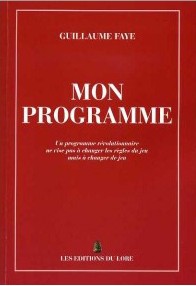 Et yndet argument mod dem, der ønsker befolkningsudskiftningen og globalismen tilbagerullet, er, at det er urealistisk eller ganske enkelt ikke kan lade sig gøre. Det har derfor stor værdi, at den franske filosof Guillaume Faye nu for sit eget lands vedkommende har skrevet et meget konkret og udførligt program for national genopretning med undertitlen: ”Et revolutionært program, der ikke skal ændre spillets regler, men ændre selve spillet.”
Et yndet argument mod dem, der ønsker befolkningsudskiftningen og globalismen tilbagerullet, er, at det er urealistisk eller ganske enkelt ikke kan lade sig gøre. Det har derfor stor værdi, at den franske filosof Guillaume Faye nu for sit eget lands vedkommende har skrevet et meget konkret og udførligt program for national genopretning med undertitlen: ”Et revolutionært program, der ikke skal ændre spillets regler, men ændre selve spillet.”


 Un avvenimento considerevole si produce nel mondo contemporaneo, un avvenimento lento, silenzioso, invisibile: le culture, le civiltà, le nazioni, i paesi vengono fusi progressivamente in una struttura tiepida che trascende le divisioni destra/sinistra, est/ovest, nord/sud, che assorbe le distinzioni politiche e ideologiche, che pialla le geografie, che pietrifica la storia.
Un avvenimento considerevole si produce nel mondo contemporaneo, un avvenimento lento, silenzioso, invisibile: le culture, le civiltà, le nazioni, i paesi vengono fusi progressivamente in una struttura tiepida che trascende le divisioni destra/sinistra, est/ovest, nord/sud, che assorbe le distinzioni politiche e ideologiche, che pialla le geografie, che pietrifica la storia.

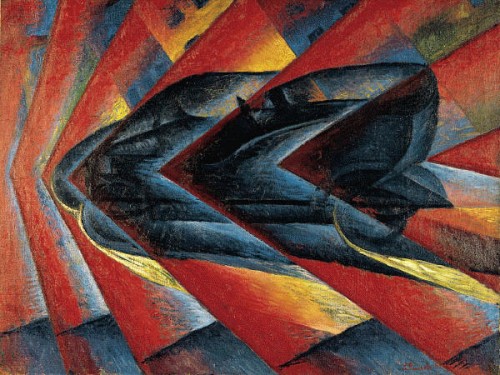
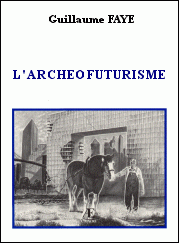 There is no question for him that the liberal project is doomed: although its proponents paint it as good and inevitable, egalitarian modernity is, in fact, a highly artificial condition, an unsustainable one, which will fall victim to the very processes it set in motion. Faye believes that we are currently facing a ‘convergence of catastrophes’. These include: the colonization of the North by Afro-Asian peoples from the South; an imminent economic and demographic crisis, caused by an aging population in the West, falling birthrates, and unfunded promises made by the democratic welfare state; chaos in the countries of the South, caused by absurd Western-sponsored development and development programs; a global economic crisis, much worse than the depression of the 1930s, led by the financial sector; ‘the surge of religious fundamentalist fanaticism, particularly in Islam;’ ‘the confrontation of North and South, on theological and ethnic grounds;’ unchecked environmental degradation; and the convergence of these catastrophes against a backdrop of nuclear proliferation, international mafias, and the reemergence of viral and microbial diseases, such as AIDS. For Faye, the way out is not through reform, because a system that is contrary to reality is beyond reform), but through collapse and revolution. As a catastrophic collapse is inevitable, revolutionary thought and action must today be post-catastrophic in outlook. He further suggests that inaction on our part will only open European civilization to conquest by Islam.
There is no question for him that the liberal project is doomed: although its proponents paint it as good and inevitable, egalitarian modernity is, in fact, a highly artificial condition, an unsustainable one, which will fall victim to the very processes it set in motion. Faye believes that we are currently facing a ‘convergence of catastrophes’. These include: the colonization of the North by Afro-Asian peoples from the South; an imminent economic and demographic crisis, caused by an aging population in the West, falling birthrates, and unfunded promises made by the democratic welfare state; chaos in the countries of the South, caused by absurd Western-sponsored development and development programs; a global economic crisis, much worse than the depression of the 1930s, led by the financial sector; ‘the surge of religious fundamentalist fanaticism, particularly in Islam;’ ‘the confrontation of North and South, on theological and ethnic grounds;’ unchecked environmental degradation; and the convergence of these catastrophes against a backdrop of nuclear proliferation, international mafias, and the reemergence of viral and microbial diseases, such as AIDS. For Faye, the way out is not through reform, because a system that is contrary to reality is beyond reform), but through collapse and revolution. As a catastrophic collapse is inevitable, revolutionary thought and action must today be post-catastrophic in outlook. He further suggests that inaction on our part will only open European civilization to conquest by Islam.
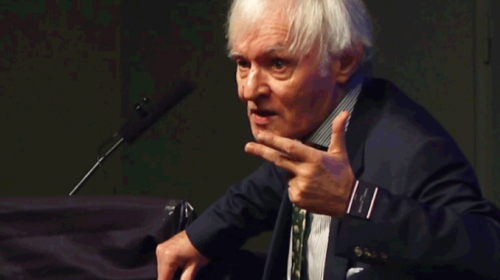
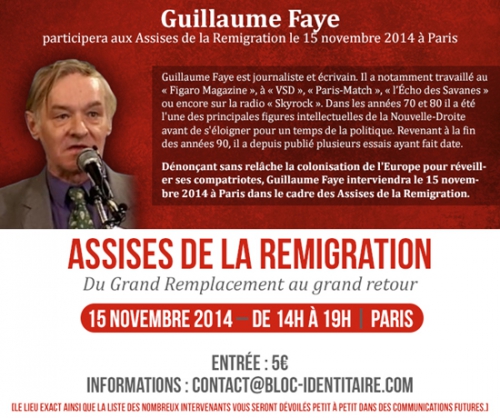

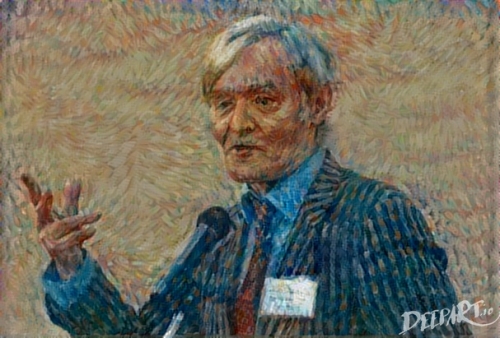
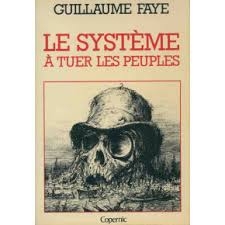 Dentro del GRECE (Groupement de recherche et d’études pour la civilisation européenne – Grupo de Investigación y Estudios para la civilización europea), se dedicó a estudiar con detenimiento la filosofía política -Machiavelo, Hobbes, Hegel, Pareto, Carl Schmitt, Oswald Spengler, Ernst Jünger, Moeller van den Bruck, Heidegger, Arnold Gehlen, Konrad Lorenz, etc.-. También desarrollaría un gran interés por las teorías geopolíticas europeistas de Jean Thiriart. Dueño de un estilo original y de una inteligencia muy lúcida, Faye ocupó un puesto importante en el GRECE y se convirtió en un referente de la Nouvelle Droite. Desde las páginas de Nouvelle École y Eléments puso su pluma al servicio del polo antimodernista del movimiento: por ello sus textos del período se destacan por su duro repudio a las ideas centrales de la Ilustración (y a sus herederos que buscan promoverlas), por su feroz crítica al materialismo y al consumismo burgués, y por sus despiadados ataques contra la tecnocracia. Alain de Benoist, entusiasmado con su ímpetu militante e impresionado con su rigor intelectual, le encomendó en 1974 la dirección de la revista Études et Recherches, la más académica de las publicaciones de la organización.
Dentro del GRECE (Groupement de recherche et d’études pour la civilisation européenne – Grupo de Investigación y Estudios para la civilización europea), se dedicó a estudiar con detenimiento la filosofía política -Machiavelo, Hobbes, Hegel, Pareto, Carl Schmitt, Oswald Spengler, Ernst Jünger, Moeller van den Bruck, Heidegger, Arnold Gehlen, Konrad Lorenz, etc.-. También desarrollaría un gran interés por las teorías geopolíticas europeistas de Jean Thiriart. Dueño de un estilo original y de una inteligencia muy lúcida, Faye ocupó un puesto importante en el GRECE y se convirtió en un referente de la Nouvelle Droite. Desde las páginas de Nouvelle École y Eléments puso su pluma al servicio del polo antimodernista del movimiento: por ello sus textos del período se destacan por su duro repudio a las ideas centrales de la Ilustración (y a sus herederos que buscan promoverlas), por su feroz crítica al materialismo y al consumismo burgués, y por sus despiadados ataques contra la tecnocracia. Alain de Benoist, entusiasmado con su ímpetu militante e impresionado con su rigor intelectual, le encomendó en 1974 la dirección de la revista Études et Recherches, la más académica de las publicaciones de la organización.
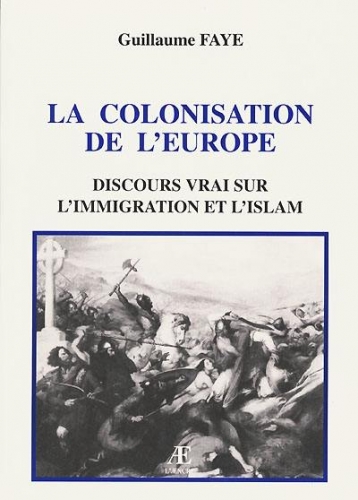 En 1997 Faye reingresa al campo político, reincorporándose al GRECE y uniéndose a Terre et Peuple. Al año siguiente publicará L’Archéofuturisme a través de la editorial L’Ancre, propiedad de Gilles Soulas. El texto denuncia el penoso estado presente de la sociedad europea, y propone aliar el espíritu del futurismo con la tradición ancestral indoeuropea, empleando a la tecnociencia para ultrapasar a la Modernidad en lugar de para consumarla. La obra, además, ataca a la estrategia metapolítica de la Nouvelle Droite, reprochándole el no haberse involucrado más activamente en la lucha electoral, lo que sólo habría perjudicado al pueblo francés. Alain de Benoist recibió con poca simpatía al libro. El discurso racialista y evidentemente en contra de la islamización de Europa de Faye quedó más prístinamente plasmado en La colonisation de l’Europe, publicado en 2000 también por la editorial L’Ancre. El libro señala que el choque de civilizaciones no puede ser resuelto con la integración o la asimilación, sino que la única salida que garantice la persistencia de la raza blanca es la Reconquista, que no sería más que una nueva guerra étnica. La publicación del libro le costó a Faye y a Soulas una onerosa multa, acusados de actuar con la intención de producir literatura que incite a la discriminación y al odio racial. Además, debido a ello, Alain de Benoist expulsó a Faye del GRECE, y acusó al escritor de haber producido una obra delirante y peligrosa.
En 1997 Faye reingresa al campo político, reincorporándose al GRECE y uniéndose a Terre et Peuple. Al año siguiente publicará L’Archéofuturisme a través de la editorial L’Ancre, propiedad de Gilles Soulas. El texto denuncia el penoso estado presente de la sociedad europea, y propone aliar el espíritu del futurismo con la tradición ancestral indoeuropea, empleando a la tecnociencia para ultrapasar a la Modernidad en lugar de para consumarla. La obra, además, ataca a la estrategia metapolítica de la Nouvelle Droite, reprochándole el no haberse involucrado más activamente en la lucha electoral, lo que sólo habría perjudicado al pueblo francés. Alain de Benoist recibió con poca simpatía al libro. El discurso racialista y evidentemente en contra de la islamización de Europa de Faye quedó más prístinamente plasmado en La colonisation de l’Europe, publicado en 2000 también por la editorial L’Ancre. El libro señala que el choque de civilizaciones no puede ser resuelto con la integración o la asimilación, sino que la única salida que garantice la persistencia de la raza blanca es la Reconquista, que no sería más que una nueva guerra étnica. La publicación del libro le costó a Faye y a Soulas una onerosa multa, acusados de actuar con la intención de producir literatura que incite a la discriminación y al odio racial. Además, debido a ello, Alain de Benoist expulsó a Faye del GRECE, y acusó al escritor de haber producido una obra delirante y peligrosa.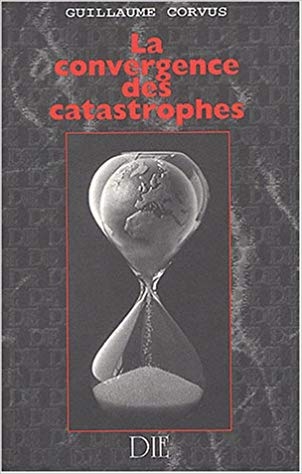 En 2004 se editan los libros La convergence des catastrophes y Le coup d’état mondial. El primero, que circuló firmado con el seudónimo «Guillaume Corvus», no es más que un resumen del pensamiento de Faye en el que –adaptando las teorías del matemático René Thom a la sociología– alerta que el sistema europeo está en peligro de colapsar debido a que las catástrofes sociales, económicas, demográficas, ecológicas e institucionales pueden confluir en un mismo momento y destruir lo que queda en pie del orden civilizatorio occidental. El otro libro, en cambio, es un análisis sobre el imperialismo estadounidense, al cual repudia, pero destacando que en Norteamérica existe el potencial para contribuir al freno del genocidio blanco (por ello amplía su idea de la Eurosiberia para incluir a los países americanos en una entidad que denominará «Septentrión»). Gracias a estas ideas su pensamiento fue bien acogido por el paleoconservadurismo norteamericano, lo que le permitiría después ser citado como uno de los inspiradores del movimiento Alt Right, gracias a Jared Taylor de American Renaissance.
En 2004 se editan los libros La convergence des catastrophes y Le coup d’état mondial. El primero, que circuló firmado con el seudónimo «Guillaume Corvus», no es más que un resumen del pensamiento de Faye en el que –adaptando las teorías del matemático René Thom a la sociología– alerta que el sistema europeo está en peligro de colapsar debido a que las catástrofes sociales, económicas, demográficas, ecológicas e institucionales pueden confluir en un mismo momento y destruir lo que queda en pie del orden civilizatorio occidental. El otro libro, en cambio, es un análisis sobre el imperialismo estadounidense, al cual repudia, pero destacando que en Norteamérica existe el potencial para contribuir al freno del genocidio blanco (por ello amplía su idea de la Eurosiberia para incluir a los países americanos en una entidad que denominará «Septentrión»). Gracias a estas ideas su pensamiento fue bien acogido por el paleoconservadurismo norteamericano, lo que le permitiría después ser citado como uno de los inspiradores del movimiento Alt Right, gracias a Jared Taylor de American Renaissance.